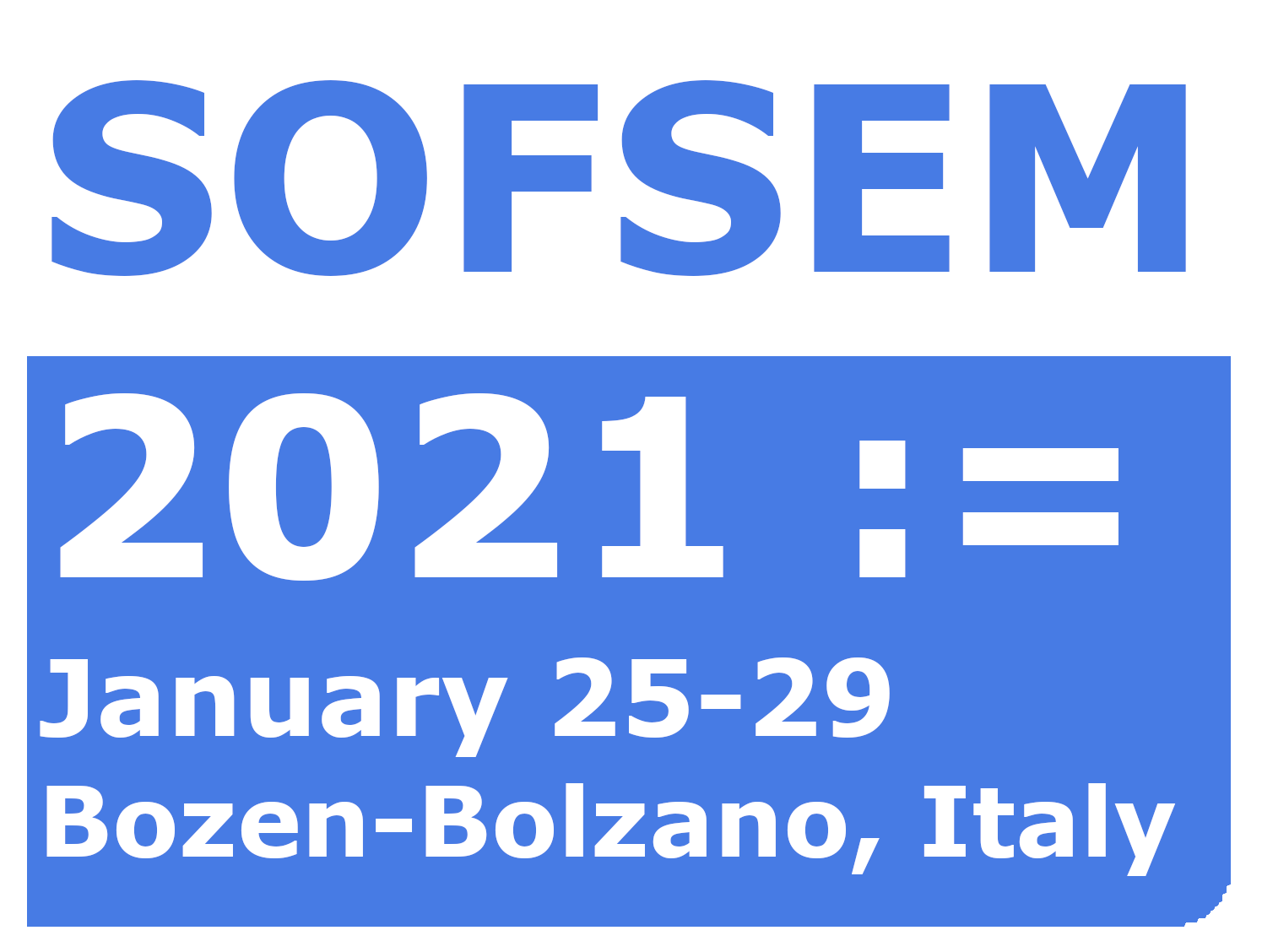Call For Papers
SOFSEM (SOFtware SEMinar) is an annual international winter conference devoted to the theory and practice of computer science, where the latest results and developments in academic and industrial research in leading areas of computer science are presented. SOFSEM has a long-standing tradition of facilitating discussions and collegial interactions. It is well-known for its familiar and inspiring atmosphere and as a meeting place for active and leading computer scientists. The program will consist of invited talks by prominent researchers, contributed talks selected from the submitted papers, and the Student Research Forum.
Tracks
SOFSEM 2021 consists of four tracks covering major sub-areas of computer science. Each track has its own program chair and program committee for peer review and feedback to authors. Please select the appropriate track of SOFSEM 2021 for your contribution.
Foundations of Computer Science
This track is devoted to the recognized core areas of foundational computer science including the theories and application of algorithms and their complexity, automata and languages, computability, data analytics, formal models, intelligent systems, programming semantics, science-inspired computing and foundations of information and software systems. Original contributions showing the value of fundamental research in areas like artificial intelligence and data science are welcome as well.
Topics include (but are not limited to):
- Algorithms and data structures
- Automata and formal languages
- Complexity theory
- Computability theory
- Cryptography and security
- Graphs and networks
- Machine learning
- Non-classical models of computing
- Theory of databases, semi-structured data, and finite model theory
- Theory of programming languages
Foundations of Software Engineering
This track presents and discusses the research on novel and innovative methods and technologies in the broader field of software engineering, including both software product and development process aspects. The track explores theories, methods and tools aiming at significantly increasing both the quality of software-intensive systems and the productivity of software development. The track promotes the discussion and interaction among researchers and practitioners on innovations and experiences for various challenges in software engineering.
Topics include (but are not limited to):
- Methods and tools for improved software processes
- Software architecture of complex software-intensive systems
- Requirements Engineering
- Model-based software engineering methods and tools
- Data-driven improvement of methods, models, and tools
- Methods and tools for software engineering applications
- Empirical Software Engineering
- Software architectures for self-adaptive and self-optimizing systems
- Methods and models for cloud and edge-cloud systems
- AI in modern software systems
- Trustworthiness and qualities of modern software systems
Foundations of Data Science and Engineering
This track is devoted to all aspects of eliciting, acquiring, modeling, storing, managing, processing, and analyzing data, with a special reference to large-scale datasets. Contributions concerning the nature of data, the techniques used for data management and analysis, the theory for extracting information from data, machine learning for data management, and the principles for data intensive computing are welcome.
Topics include (but are not limited to):
- Data Models and Query Languages
- Data Integration and Interoperability
- Query Processing and Optimization
- Spatial, Temporal, Multimedia Data
- Web- and Graph-based Data
- Probabilistic and Uncertain Data
- Information Extraction and Retrieval
- Data Privacy, Security, and Trust
- Distributed, Parallel, and P2P Data Processing and Management
- Data Semantics and Linked Data
Foundations of Algorithmic Computational Biology
This track is devoted to complexity and algorithmic novelties to solve problems in computational biology. More precisely, it aims at displaying research using graph algorithms, string algorithms and combinatorial optimization to deal with problems arising from biology. Papers may be purely theoretical contributions with limited biological application, or a mixture of theoretical and experimental contributions, with a relevant algorithmic part.
Topics include (but are not limited to):
- Alignment and assembly of sequences
- Biological networks
- Cancer genomics
- Comparative genomics
- Gene expression
- Phylogenetics
- Sequence analysis
- System biology
Selected papers from the track on Foundations of Algorithmic Computational Biology are considered for a journal special issue in Algorithms [more].
Submission Guidelines
We solicit papers that describe original research works that are relevant to the tracks listed above and not published or under review elsewhere. Papers must be submitted electronically via Easychair in Springer format (max 12 pages). Submitted papers will undergo a peer review process. [more]
Proceedings
The proceedings will be published by Springer in the ARCoSS/LNCS series.
Venue
The SOFSEM 2021 Conference will be hosted at the Free University of Bozen-Bolzano, Italy. Bozen-Bolzano is the capital city of the Province of South Tyrol located in the heart of the Alps. The city is famous for the 5000 year old iceman "Ötzi" in the archaeological museum and as an entrance to the Dolomites, a UNESCO World Heritage Site. [more]




